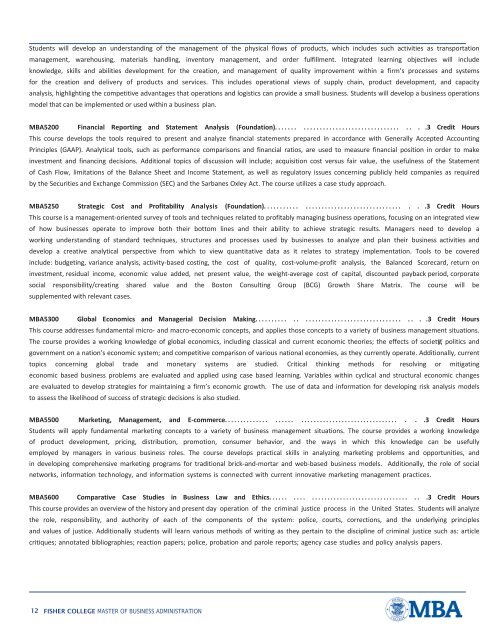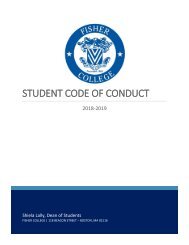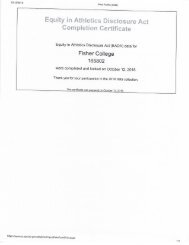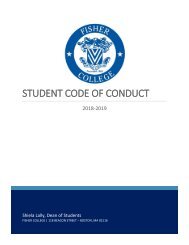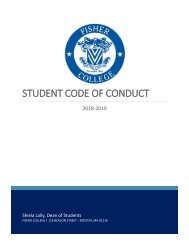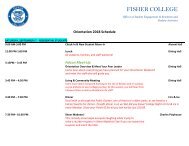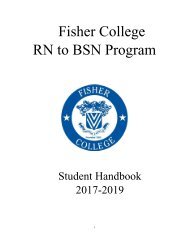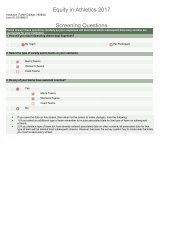MBA Catalog and Student Handbook
You also want an ePaper? Increase the reach of your titles
YUMPU automatically turns print PDFs into web optimized ePapers that Google loves.
<strong>Student</strong>s will develop an underst<strong>and</strong>ing of the management of the physical flows of products, which includes such activities as transportation<br />
management, warehousing, materials h<strong>and</strong>ling, inventory management, <strong>and</strong> order fulfillment. Integrated learning objectives will include<br />
knowledge, skills <strong>and</strong> abilities development for the creation, <strong>and</strong> management of quality improvement within a firm’s processes <strong>and</strong> systems<br />
for the creation <strong>and</strong> delivery of products <strong>and</strong> services. This includes operational views of supply chain, product development, <strong>and</strong> capacity<br />
analysis, highlighting the competitive advantages that operations <strong>and</strong> logistics can provide a small business. <strong>Student</strong>s will develop a business operations<br />
model that can be implemented or used within a business plan.<br />
<strong>MBA</strong>5200 Financial Reporting <strong>and</strong> Statement Analysis (Foundation)....... .............................. .. . .3 Credit Hours<br />
This course develops the tools required to present <strong>and</strong> analyze financial statements prepared in accordance with Generally Accepted Accounting<br />
Principles (GAAP). Analytical tools, such as performance comparisons <strong>and</strong> financial ratios, are used to measure financial position in order to make<br />
investment <strong>and</strong> financing decisions. Additional topics of discussion will include; acquisition cost versus fair value, the usefulness of the Statement<br />
of Cash Flow, limitations of the Balance Sheet <strong>and</strong> Income Statement, as well as regulatory issues concerning publicly held companies as required<br />
by the Securities <strong>and</strong> Exchange Commission (SEC) <strong>and</strong> the Sarbanes Oxley Act. The course utilizes a case study approach.<br />
<strong>MBA</strong>5250 Strategic Cost <strong>and</strong> Profitability Analysis (Foundation)........... .............................. . . .3 Credit Hours<br />
This course is a management-oriented survey of tools <strong>and</strong> techniques related to profitably managing business operations, focusing on an integrated view<br />
of how businesses operate to improve both their bottom lines <strong>and</strong> their ability to achieve strategic results. Managers need to develop a<br />
working underst<strong>and</strong>ing of st<strong>and</strong>ard techniques, structures <strong>and</strong> processes used by businesses to analyze <strong>and</strong> plan their business activities <strong>and</strong><br />
develop a creative analytical perspective from which to view quantitative data as it relates to strategy implementation. Tools to be covered<br />
include: budgeting, variance analysis, activity-based costing, the cost of quality, cost-volume-profit analysis, the Balanced Scorecard, return on<br />
investment, residual income, economic value added, net present value, the weight-average cost of capital, discounted payback period, corporate<br />
social responsibility/creating shared value <strong>and</strong> the Boston Consulting Group (BCG) Growth Share Matrix. The course will be<br />
supplemented with relevant cases.<br />
<strong>MBA</strong>5300 Global Economics <strong>and</strong> Managerial Decision Making.......... .. .............................. .. . .3 Credit Hours<br />
This course addresses fundamental micro- <strong>and</strong> macro-economic concepts, <strong>and</strong> applies those concepts to a variety of business management situations.<br />
The course provides a working knowledge of global economics, including classical <strong>and</strong> current economic theories; the effects of society, politics <strong>and</strong><br />
government on a nation’s economic system; <strong>and</strong> competitive comparison of various national economies, as they currently operate. Additionally, current<br />
topics concerning global trade <strong>and</strong> monetary systems are studied. Critical thinking methods for resolving or mitigating<br />
economic based business problems are evaluated <strong>and</strong> applied using case based learning. Variables within cyclical <strong>and</strong> structural economic changes<br />
are evaluated to develop strategies for maintaining a firm’s economic growth. The use of data <strong>and</strong> information for developing risk analysis models<br />
to assess the likelihood of success of strategic decisions is also studied.<br />
<strong>MBA</strong>5500 Marketing, Management, <strong>and</strong> E-commerce.............. ...... ............................... . . .3 Credit Hours<br />
<strong>Student</strong>s will apply fundamental marketing concepts to a variety of business management situations. The course provides a working knowledge<br />
of product development, pricing, distribution, promotion, consumer behavior, <strong>and</strong> the ways in which this knowledge can be usefully<br />
employed by managers in various business roles. The course develops practical skills in analyzing marketing problems <strong>and</strong> opportunities, <strong>and</strong><br />
in developing comprehensive marketing programs for traditional brick-<strong>and</strong>-mortar <strong>and</strong> web-based business models. Additionally, the role of social<br />
networks, information technology, <strong>and</strong> information systems is connected with current innovative marketing management practices.<br />
<strong>MBA</strong>5600 Comparative Case Studies in Business Law <strong>and</strong> Ethics...... .... ............................... .. .3 Credit Hours<br />
This course provides an overview of the history <strong>and</strong> present day operation of the criminal justice process in the United States. <strong>Student</strong>s will analyze<br />
the role, responsibility, <strong>and</strong> authority of each of the components of the system: police, courts, corrections, <strong>and</strong> the underlying principles<br />
<strong>and</strong> values of justice. Additionally students will learn various methods of writing as they pertain to the discipline of criminal justice such as: article<br />
critiques; annotated bibliographies; reaction papers; police, probation <strong>and</strong> parole reports; agency case studies <strong>and</strong> policy analysis papers.<br />
12 FISHER COLLEGE MASTER OF BUSINESS ADMINISTRATION


